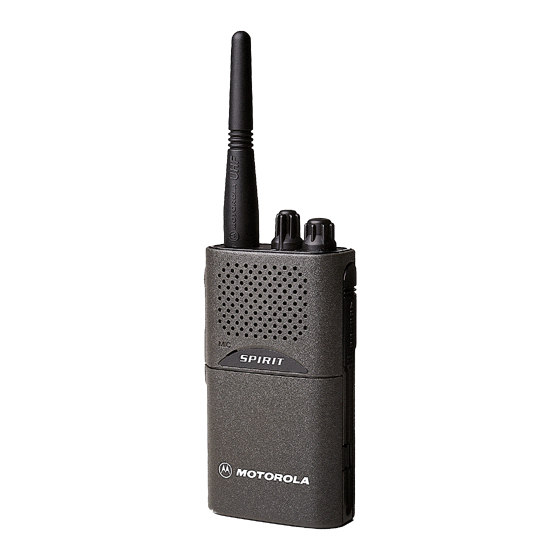Motorola HMN9038 - HMN 9038 - Headset Panduan Pemilik - Halaman 10
Jelajahi secara online atau unduh pdf Panduan Pemilik untuk Radio Dua Arah Motorola HMN9038 - HMN 9038 - Headset. Motorola HMN9038 - HMN 9038 - Headset 24 halaman. Professional two-way radio

P R O G R A M M I N G
Understanding Frequencies
and Codes
Frequencies:
Your radio operates on a group of frequencies
(see page 10 for complete listing). You
access frequency(ies) through radio chan-
nel(s). You can operate on any of your radio's
frequencies, but each must be licensed
through the FCC (see page 2).
To understand the difference between fre-
quencies and channels, think of channels as
pre-set buttons on your car stereo and the
frequencies as the many radio stations avail-
able. You can select and save different sta-
tions (frequencies) to pre-set buttons
(channels) for easy access.
Interference Eliminator Codes:
Codes filter out static, noise and unwanted
chatter on radio channels (see page 11 for
complete listing). When you operate on a fre-
quency with a code set, you block out most
interference on the frequency. This allows you
to communicate with less interference than
when operating without a code. Remember,
since radio frequencies can be monitored,
codes will not make your conversations private.
• For compatibility with radios that do not
have codes, the radio can be set to Code
"Off" in the programming mode. See fol-
lowing instructions.
IMPORTANT
To talk to others in your group all radios
must be set to the same channel and code.
There are settings programmed into your radio
for frequencies and codes. If it is necessary to
confirm settings or to change them for licens-
ing purposes, the radio will audibly guide you
through a series of programming steps. If you
have questions, please call Motorola Product
Services at 1-800-448-6686.
8
To Change Frequency and
Code Settings
1 Channel Models
1. Hold Push-To-Talk button down while
turning radio on. Fig. J
Radio announces current frequency
setting. Example: "frequency one"
2. Press Push-To-Talk button to scroll
through frequencies.
Radio announces each frequency as
you scroll. Example: "two...three..."
3. Release Push-To-Talk when you have
reached desired frequency.
4. Press Monitor button to select and save
new frequency setting. Fig. L
Radio announces current code setting.
Example: "code two nine"
5. Press Push-To-Talk to scroll through
codes.
Radio announces each code as you
scroll. Example: "three zero...three
one"
6. Release Push-To-Talk when you have
reached desired code.
7. Press Monitor button to select and save
new code setting.
Radio "beeps" to indicate it has exited
programming and is ready for use.
1 Channel Model
FIG. J
Fig. K
